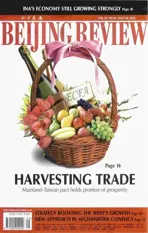CRISIS FOCUS A Question of Market Confidence
2010-09-12
CRISIS FOCUS A Question of Market Confidence

Having overcome the worst period of the fnancial crisis, the world economy is getting back on the growth path. Meanwhile, risks have risen sharply amid renewed fnancial turbulence around the world. The World Economic Outlook Update, released by the IMF on July 8, discussed this issue. Edited excerpts follow:
Global indicators of real economic activity remained strong through April and stabilized at a high level in May. Industrial production and trade posted double-digit growth; consumer confdence continued to improve, and employment growth resumed in advanced economies. Overall, macroeconomic developments during much of the spring met expectations of a modest but steady recovery in most advanced economies and strong growth in many emerging and developing economies. World economic growth is projected at about 4.5 percent in 2010 and 4.25 percent in 2011.
Nevertheless, recent turbulence in fnancial markets—refecting a drop in confdence about fscal sustainability, policy responses and future growth prospects—has called a prosperous outlook into question. Crucially, fscal sustainability issues in advanced economies came to the fore during May, fuelled by initial concerns over fscal positions and competitiveness in Greece and other vulnerable euro area economies.
In principle, the renewed fnancial turbulence could spill over to the real economy through several channels, involving changes in domestic and external demand and in relative exchange rates. The supply of bank credit could be curtailed by heightened uncertainty about fnancial sector exposure to sovereign risk as well as increased funding costs, notably in Europe. Moreover, lower consumer and business confdence could suppress private consumption and investment. Given trade and fnancial linkages, the ultimate effect could be substantially lower global demand.
Against this uncertain backdrop, the overarching policy challenge is to restore fnancial market confdence without choking the recovery.
In the euro area, well-coordinated policies to rebuild confdence are particularly important. Immediate priorities in the fnancial sphere include: making the new European Stabilization Mechanism fully operational, resolving uncertainty about banks’ exposure to sovereign debt, ensuring European banks have adequate capital buffers, and continuing liquidity support.
On a global level, policies should focus on implementing credible plans to lower fscal defcits over the medium term while maintaining supportive monetary conditions, accelerating fnancial sector reform, and rebalancing global demand.
Recently renewed fnancial strains underscore the urgent need to reform fnancial systems and restore the health of banking systems. In many advanced economies, more progress is needed on bank recapitalization; bank consolidation, resolution and restructuring; and regulatory reform.
Last but not least, the ongoing rebalancing of global demand must be supported by bold policy action. To some extent, fnancial markets and capital fows are already facilitating global demand rebalancing through currency pressures, although many economies have been resisting them by building up reserves.
In economies with excessive external surpluses, the transition toward domestic sources of demand should continue, helped by structural policies to reform social safety nets and to improve productivity in the service sector as well as, in a variety of cases, more fexible exchange rates. In economies with excessive external defcits, fscal consolidation and fnancial sector reform should help rebalance demand.
